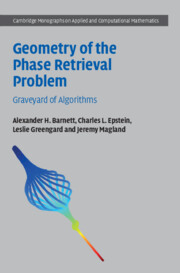Book contents
- Frontmatter
- Contents
- Preface
- Acknowledgments
- 1 Introduction
- Part I Theoretical Foundations
- 2 The Geometry Near an Intersection
- 3 Well-Posedness
- 4 Uniqueness and the Nonnegativity Constraint
- 5 Some Preliminary Conclusions
- Part II Analysis of Algorithms for Phase Retrieval
- Part III Further Properties of Hybrid Iterative Algorithms and Suggestions for Improvement
- References
- Index
3 - Well-Posedness
from Part I - Theoretical Foundations
Published online by Cambridge University Press: 21 April 2022
- Frontmatter
- Contents
- Preface
- Acknowledgments
- 1 Introduction
- Part I Theoretical Foundations
- 2 The Geometry Near an Intersection
- 3 Well-Posedness
- 4 Uniqueness and the Nonnegativity Constraint
- 5 Some Preliminary Conclusions
- Part II Analysis of Algorithms for Phase Retrieval
- Part III Further Properties of Hybrid Iterative Algorithms and Suggestions for Improvement
- References
- Index
Summary
A mathematical problem is well posed if, for all appropriate data, it has a unique solution, and this solution depends continuously, in a useful sense, on that data. The phase retrieval problem does not usually have a unique solution, but the set of solutions generically consists of trivial associates, which are, for practical purposes, equivalent. This chapter addresses various ways in which the phase retrieval is not well posed. It begins with a theorem demonstrating that the solution to the phase retrieval problem, using support as the auxiliary data, is locally defined, near a given solution, by a Lipschitz map if and only if the intersection is transversal. In the previous chapter, we have shown that this is rarely the case. Near a nontransversal intersection this map is, at best, Holder-1/2, and so the phase retrieval problem is not well posed. We then consider the question of the uniqueness of the solution, in finite precision arithmetic, showing several distinct ways in which this can fail.
- Type
- Chapter
- Information
- Geometry of the Phase Retrieval ProblemGraveyard of Algorithms, pp. 65 - 84Publisher: Cambridge University PressPrint publication year: 2022

